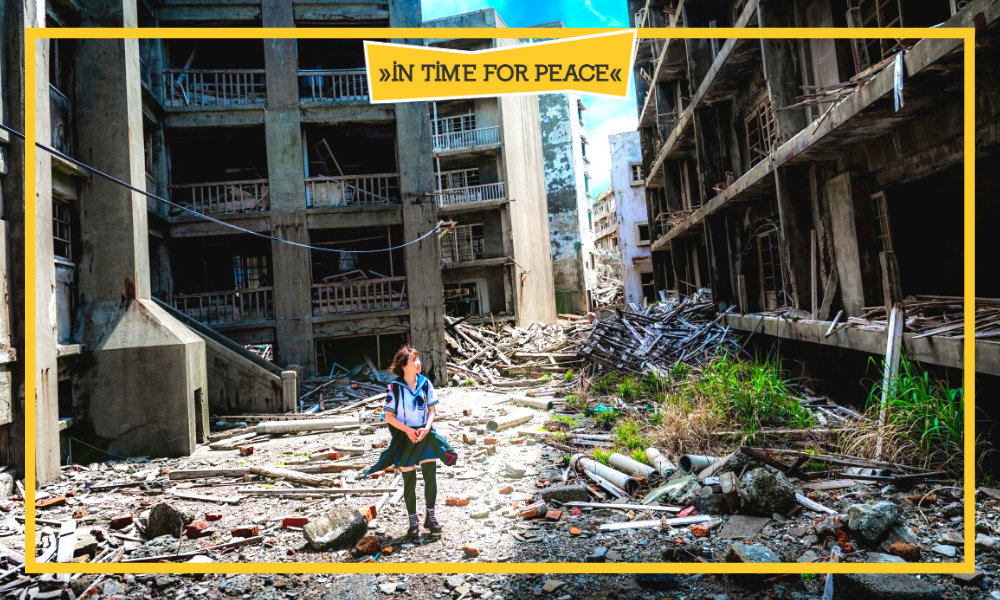
Watch
The way of life and the culture of fraternity

Adriana Cosseddu, Professor of Criminal Law at the University of Sassari and Director of “Communion and Law” international network of legal professionals, guides us through the themes of United World Week 2020 (justice, legality, human rights, peace), to raise our awareness of how our action for a united world can impact a society coping with the Covid-19 pandemic.
Day by day the world map is turning red, with symbols marking the advance of danger, igniting fear over the spread of the invisible and still little-known “virus” (Covid-19), which is infecting and confusing us.
In this scenario, globalization which has been characterized up to now by the logic of profit, of market forces and economic systems, seems to have hit rock bottom. Whereas humanity, from North to the South of the world, at the same time is incorporating its most authentic value: not as an indeterminate subject, referred to in Declarations or Treaties, but the faces of actual persons, each with their own personal story and family background. Linked by a suffering which touches everyone, we are recognising “goods” which can’t be bought or seen, such as time and self-giving to others. Vulnerability and fragility have been reclaimed as part of our common humanity, whatever our age, young and old, whatever our social status, however humble or powerful, citizens and politicians alike.
However, this is not so much a form of equality for all, rather it’s the confirmation of the equal dignity, actually the humanity of each one of us, without preference or prejudice, without selection or exclusion. In the pandemic enveloping us all, humanity is forcing us to contemplate the issue of life, the first inviolable human right, from which all other rights spring, the one that exposes countless injustices being endured.
Justice
Taking a look at reality in the light of these times, we see health interventions and care available for many, hospitals welcoming patients with dedicated committed staff, available for many. But not for all. Not for the “least”, not for the homeless. Media coverage highlighted the “care” available to homeless citizens in the great city of Las Vegas: each one allocated a car-sized space in an outdoor parking lot in order to keep the prescribed distance apart and avoid contagion. A dramatic example of safety measures following the “rule” – and no-one is questioning the importance of the norm. But we must also have a perspective that sees “beyond” the rule, so when we talk of ‘rights’ we’re talking of the place where justice happens. This has always been an aspiration for humanity. It’s ever-present in the cry of the poor as they wait, in the appeal of victims, in the demands for adequate legal norms to regulate our coexistence, in the quest for conflict resolution and protection of our rights. The definition of justice determines values, principles and rules. The practice of justice determines behaviours and peace within society.
But there is a second parallel narrative accompanying the story of humanity: the biblical account of God’s covenant with us. We recall the question to Cain after Abel’s murder, “where is your brother?”, and Cain’s reply, “am I my brother’s keeper?” This reverberates in our own time, when, for example, Jürgen Habermas affirms that justice «taken in its universalistic sense, demands that everyone is responsible for each other»[1]. The foundation of justice must always be rooted in the person, in the dignity constituent to everyone’s identity.
Legality
This is the setting required if legality itself is to take on its most authentic character: so that laws can be applied impartially, without fear or favour, in recognition of the equal dignity of each person. According to Italian jurist Piero Calamandrei, legality can best be explained by the command: «don’t do to others what you would not like them to do to you», so as to «feel our own fate in the fate of the others»[2].
Globalization has failed to unify but instead, by creating new inequalities it has generated widespread indifference alongside countless injustices. Today, the unexpected suffering we have found ourselves in, has made us rediscover the other, the face of the other, their need for help, their need for a gesture, however small, that communicates a love which is capable of filling the chasm of emptiness within. We see this in all those lives drawing to an end without any relative nearby, but accompanied maybe by a nurse who uses her mobile phone or tablet so a grandmother can greet her loved ones, to give some consolation in those last moments and ease such tragic solitude. Hidden lives have become front page headlines.
In this way, our wounded humanity starts to reconstitute its network of relationships, from the ground up and establish new connections, intermingled with pain, precisely what we would never have wished for in our lives. It’s taken us by surprise. But it’s helped to dismantle our conditioning, our prejudices and reliance on appearances and stereotypes. So we can start to really connect with one another and re-establish relationships which had somehow been lost.
Human Rights
And so to the question: «can someone I haven’t chosen, I don’t recognise […], someone who doesn’t live in my own space […], who doesn’t share my own way of thinking, can such a one be considered my neighbour, my brother or sister?»[3] This question does not take us unprepared, locked in a form of resigned indifference or turned in on ourselves. Because, almost without noticing it, an impulse of fraternity is driving our movements. Freedom, which we cherish as a fundamental right, to protect in safeguarding our own individuality, without any duty to another, shows itself capable of making a gift of itself, of that portion of freedom I’m prepared to lose in order to protect health, which is everyone’s right. Equality, which is often measured according to one’s own privileges and claims, without thinking of the other’s, can also find a living principle in fraternity. We see it being implemented by those who console a lonely old person, offering company and assistance, without thinking of themselves.
We’re rediscovering it as a principle coming to life as we reform the relational fabric of our society: in the ‘link’ we come to recognise or generate across the desolate absence of relationship; in the ‘bridge’, real or symbolic, needed to unite or cover the distance between separated citizens and institutions; transforming ‘contacts’ into ‘relationships’.
This is undoubtedly a powerful moment in the story of humanity. Solidarity is recognized in the Preamble of the Charter of Fundamental Rights of the European Union as a «universal value». Fraternity is invoked as a ‘way of acting’ in Article 1 of the Universal Declaration of Human Rights (1948). Now, both solidarity and fraternity are seen emerging into everyday life. Almost with surprise, we also notice the signs in collaborative relationships between States. They are becoming elements of a culture capable of rebuilding the fractured condition of sharing in proximity, of living side by side. We see it where the sufferings of the present are forging new links of fraternity rediscovered in society.
How can we read it now? It’s hidden within that restriction to personal freedom which I accept and abide by in order to generate caring relationships towards others, whom I don’t know, but who, together with me, form part of the community. It’s manifest in many expressions of creativity designed to encourage people to stay at home, as active protagonists in a healing process. It’s expressed in the smile behind a face mask. It’s where our responsibility is able to create the space in which another can find themselves, beyond our wounded humanity. In other words, it means to make ourselves an answer of love for the other. And many daily occurrences now testify to this.
But we are well aware that there is much more to it than this. Many parts of the world suffer never-ending cycles of violence, and the forgotten ones remain marginalized, invisible to the majority, denied their basic rights. Speaking at the United Nations, on 28 May 1997, Chiara Lubich, founder of the Focolare Movement, gave an assessment that is just as applicable to our situation today. In the face of wars and the endless justifications used to generate them, what’s needed is “a supplement”, rooted in the «value of love», given that the «future of the world […] its capacity to progress, to find solutions to conflicts and crises, depends uniquely on the awareness of individuals and the commitment of people»[4].
And the Preamble of the UNESCO Constitution, adopted in 1946, declares, «That since wars begin in the minds of men, it is in the minds of men that the defences of peace must be constructed».
Build peace
There is still a long way to go. We recall Martin Luther King’s Letter from a Birmingham Jail (16 April 1963) in which he proclaims the need for «a substantive and positive peace, in which all men will respect the dignity and worth of human personality».
We just have to think about what’s happening in our penitentiary system today: prisoners, isolated from their families, terrified of contagion, rebel and take to the roofs in protest at their conditions. Workers too are at risk, either from losing their jobs or working without any safeguards “whatever the cost”. Peace is not the absence of war or conflict. It’s built by creating the conditions which give life to just relationships, in respect for one another, knowing how to listen, and offering recognition and welcome through dialogue.
Globalization is changing scenario. No longer production and trading no matter what, according to the logic of profit and consumption. But rather as the space in which that something more brought by sharing and co-responsibility obliges us to decide on new steps which through legislation bring about changing the rules. The problem of how to restart the economy and return to work is now being addressed. But that face of the other – so dear to Emmanuel Lévinas – which we’ve rediscovered in this period, reminds us that Articles 23 and 25 of the Universal Declaration of Human Rights (UDHR) list as essential: the right to work, to a standard of living adequate for health, including food, clothing, housing and medical care and necessary social services. All rights still to be implemented effectively, but a larger framework is still missing, as already indicated by UDHR Article 29, paragraph 1 which requires of everyone «duties to the community».
An interplay of factors which bring us to an ever-relevant paradigm: the common good, which does not function to limit the exercize of one’s rights, but as a rule to guide the exercize of power. As has been written, «The common good is not a preconceived given against which rights are destined to clash […]; it is rather a normative criterion of action and a value-driven background of which human rights are an integral part. In addition, as well as rights, it is a regulatory criterion in respect of the use of political power: justifying it, guaranteeing the exercize of power in legitimate and non-arbitary forms»[5].
For a culture of fraternity
This period has exposed our being “simply” human persons. Whatever the conditions we live in, through our common humanity, we’ve found ourselves capable of feeling the other person’s suffering as our own. This essential perspective has now been shared by many, including people of differing beliefs, because it doesn’t respond to opposing interests, but rather to the actual need for a communion of life in society.
Perhaps this is the source of the sentiment being expressed so often now: after all this is over, the world will never be the same. It won’t be, if together we become generators of a new culture which in a horizon of fraternity, waits on us to be fulfilled in reciprocity. It’s up to us to re-read it as the reality of rights which don’t forget duties, for the sake of that debt of which our humanity and the other through his or her very existence always reminds us.
The “grammar” of this is inscribed in every human being, as their indelible dignity, which indicates essence and identity, source and origin of many relationships.
It’s fundamental in the human person’s individual and universal dimension, on their own and as peoples.
It’s proactive in promoting the humanity of the other.
It’s a presence which through the other, particularly the weakest and most fragile, continues to challenge us.
This, perhaps, is the lesson we’re being taught by what’s happening today.
But let Pope Francis have the last word, taken from his address to the “The Future You” meeting for youth (TED) at Vancouver on 26 April 2017.
«The future of humankind isn’t exclusively in the hands of politicians, of great leaders, of big companies. But the future is, most of all, in the hands of those people who recognize the other as a “you” and themselves as part of an “us.” […] A single individual is enough for hope to exist. And that individual can be you. And then there will be another “you,” and another “you,” and it turns into an “us.” And so, does hope begin when we have an “us?” No. Hope began with one “you.” When there is an “us,” there begins a revolution.»
Adriana Cosseddu
[1] J. Habermas, Die Einbeziehung des Anderen. Studien zur politischen Theorie, Frankfurt am Main, 1996, trad. it. L’inclusione dell’altro. Studi di teoria politica, a cura di L. Ceppa, Milano, 2008, p. 42 s.
[2] P. Calamandrei, Fede nel diritto, a cura di S. Calamandrei, Roma-Bari, 2008, pp. 85 e 103 ss.
[3] L. Alici, Il terzo escluso, Milano, 2004, p. 138.
[4] Sono, queste ultime, le espressioni rivolte a Chiara Lubich dal Pastore Stroudinsky, durante la Conferenza stampa all’Auditorium Calvin, Ginevra, 25 ottobre, 2002, ACL-DS-2002 1025-TT-A.
[5] Concorre a tale lettura J. M. Finnis, nella sua riconsiderazione del bene comune, Postscript, in Id., Natural Law and Natural Rights, Oxford University Press, Oxford, 2ᵃ ed., 2011, di recente ripreso da M. Zanichelli, Diritti umani e bene comune, in Bene comune fondamenti e pratiche, a cura di F. Botturi e A. Campodonico, Milano, 2014, p. 147 ss.






